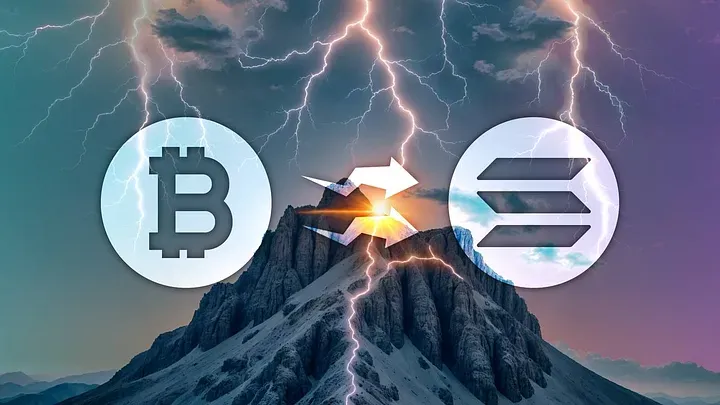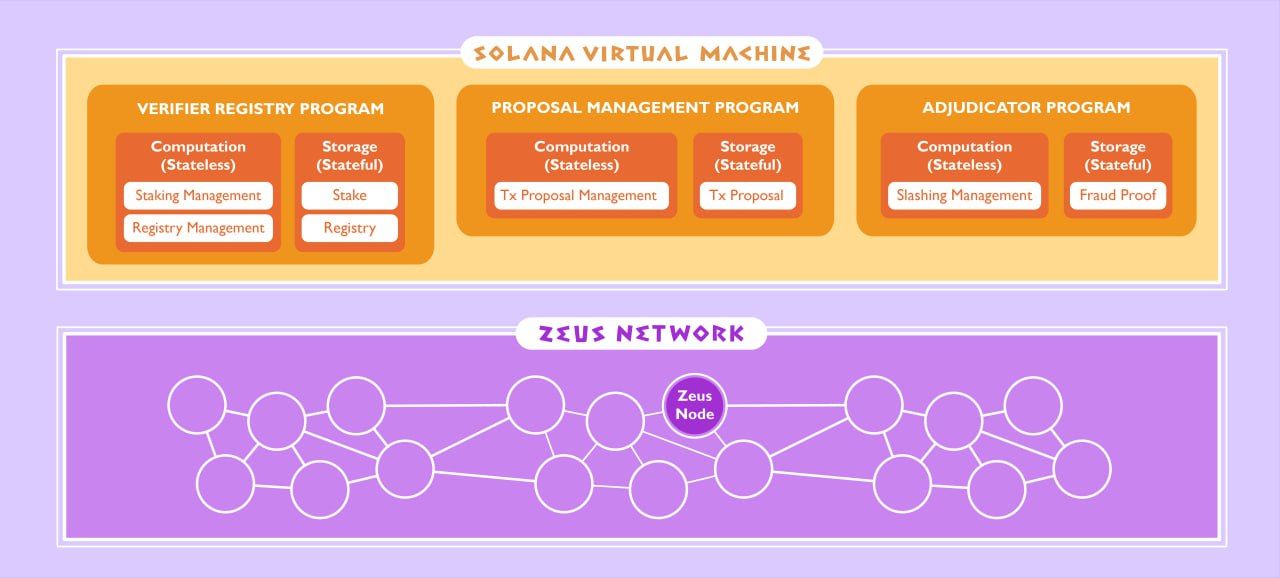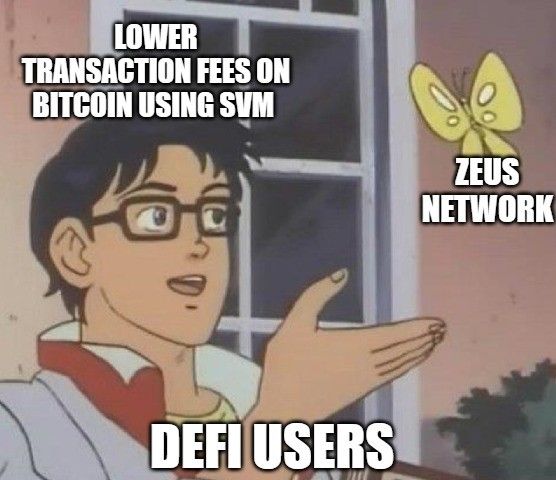They said Ordinal is dead and now Runes may be defunct
— Justin | Zeus Layer ⛈️ (@dappiokeeper) April 23, 2024
but the tech, community, and belief persist…
Solana has the potential to revive them, offering a second chance for higher speed, improved UX, and most importantly, interaction with the most vested social layer in the…
"They said Ordinal is dead and now Runes may be defunct but the tech, community, and belief persist… Solana has the potential to revive them, offering a second chance for higher speed, improved UX, and most importantly, interaction with the most vested social layer in the space @ZeusNetworkHQ will save y’all soon, hang in there." - (Justin, Founder of Zeus Network, 2024)
Decentralized Finance (DeFi) is booming, but certain limitations on the Bitcoin network create hurdles for wider adoption. Now Zeus Network, a permissionless communication layer connecting Bitcoin and Solana. This first of its kind connection unlocks the security and liquidity of Bitcoin for DeFi applications built on Solana's fast and cost-effective blockchain.
In this article, we'll explore Zeus Network, learning how it facilitates secure Bitcoin transfers on Solana. We'll also uncover the benefits it offers DeFi users and developers, then we'll discuss the exciting potential it holds for the future of DeFi.
What is Zeus Network?
Zeus Network functions as a communication layer, acting as a bridge between the Bitcoin and Solana blockchains. It facilitates seamless interaction between these two ecosystems, allowing DeFi applications built on Solana to leverage the security and liquidity of Bitcoin.

Unlike traditional wrapped tokens, which can introduce additional risks, Zeus Network fosters trustless communication through secure channels. In essence, it unlocks the power of Bitcoin for DeFi applications on Solana without compromising on security.
Why is Zeus Network Important?
Which Bitcoin layer 2 are you most bullish on? pic.twitter.com/UfhnZhBL9c
— Coin Bureau (@coinbureau) April 22, 2024
The DeFi ecosystem craves both security and speed. Whilst Bitcoin offers unparalleled security, its limitations in scalability hinder its usability within DeFi. Here, Zeus Network emerges as a game-changer. By facilitating secure Bitcoin transfers at neck breaking speeds on Solana, Zeus Network fills in this critical gap.
This unlocks the vast liquidity of Bitcoin for DeFi applications on Solana, enabling faster transactions, lower fees, and a better DeFi experience for users. So essentially, Zeus Network lets developers create innovative financial products without compromising user security.
How Does Zeus Network Work?
At its core, Zeus Network utilizes a two-way peg system. When a user deposits Bitcoin onto the Zeus Network, an equivalent amount is locked in a secure vault on the Bitcoin blockchain. Simultaneously, a corresponding digital representation, or synthetic Bitcoin (zBTC), is minted on the Solana blockchain.

This zBTC can then be freely used within DeFi applications built on Solana. Conversely, when a user wishes to withdraw their Bitcoin, they simply burn the corresponding zBTC, and their original Bitcoin is unlocked from the vault on the Bitcoin blockchain.
Benefits of Using Zeus Network

Zeus Network offers a multitude of advantages for both DeFi users and developers. Here's a closer look at some of the key benefits it brings to the table:
- Better Ecosystem: Since Zeus allows Solana and Bitcoin to communicate and interact with each other, this creates a more interconnected DeFi ecosystem where assets and information can seamlessly move across various chains.
- Greater Market Liquidity: With Zeus Network, DeFi developers can gain access to the vast liquidity of Bitcoin for their applications on Solana, which in turn leads to better markets. Higher liquidity leads to lower bid-ask spreads, which reduces trading costs and makes markets more attractive to users.
- Lower Transaction Fees: Bitcoin's notorious scalability issues often result in high transaction fees. By leveraging Solana's high throughput and low fees, Zeus Network makes for significantly faster and more cost-effective Bitcoin transfers for DeFi applications.
- Adoption: As Solana and Bitcoin become more interwoven, businesses and users are more likely to adopt blockchain solutions, knowing that they can interact with other networks. This fosters wider adoption of blockchain technology.
The Future of Zeus Network
Zeus Network has the potential to be a major force in DeFi. By curating secure and efficient Bitcoin transfers on Solana, it ensures a new era of interoperable DeFi applications.
As the project continues to develop, we can expect to see even greater integration with various DeFi protocols and the creation of novel financial instruments that leverage the combined strengths of Bitcoin and Solana, such as Apollo.

Apollo communication protocol is set to bring Bitcoin’s liquidity to Solana by issuing 1:1 Pegged zBTC. It does this by implementing an on-chain Bitcoin multi-sig wallet on SVM (Solana Virtual Machine) which is controlled by a staked committee of verifiers.
There are lots planned out and outlined by the Zeus Network team, which include:
- Native Stake / Wrap Bitcoin with Solana Yield (Chapter Apollo)
- Liquidity Tranche of Bribery System (Chapter Artemis)
- Native Bitcoin Collateralized Stablecoin
- Native & Cross Chain NFT tools
- Native & Borrow / Lending between all Bitcoin layers and Solana.
These will in turn piece together every part of the Zeus Network. They are but a few of the opportunities available for founders and developers alike to discover, explore, and build upon Zeus Network.
Zeus Network architecture also consist of two primary components namely the Zeus Node and the Solana Virtual Machine (SVM) which are responsible for state-related functionalities.
Zeus Node will offer key services such as Peer-to-peer, Signing, Broadcast, and Verifier Registry, contributing to the decentralization and efficient operation of the network.
Within the SVM, various programs further enhance its strengths:
- The Verifier Registry Program takes care of the registration of verifiers.
- The proposal management program governs proposal-related processes.
- The adjudicator program oversees adjudication activities.
This structured framework ensures the seamless integration and functionality of the Zeus Network, emphasizing both peer-to-peer communication services and state-related programmatic elements within the Solana Virtual Machine.
Conclusion

Zeus Network brings forth a compelling solution to the issues that has hindered the seamless connection between Bitcoin and DeFi. By harnessing the security of Bitcoin and the scalability of Solana, it empowers DeFi developers to create innovative applications that cater to a wider audience.
As Zeus Network continues to evolve, it has the potential to become a household name in the DeFi space by offering a secure, efficient, and user-friendly experience for all.